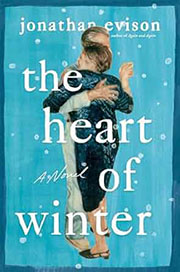
| Mon
Book Info
Subscribe
| |||
Dear Reader, Why do I "feel the need?" I don't know. Personally, I think I'm just a bit strange, but people tell me it's a midwestern thing. Yes I live in Florida, but I'm a Madison, Wisconsin transplant--who grew up in Cuba City, Wisconsin. (My mother would never forgive me if I didn't plug her hometown.) It's bizarre, but I seem to feel the need to tack a complete confession on the back end of almost every yes-and-no I pronounce. When you ask this original Wisconsin gal, "Can you meet me at four o'clock tomorrow?" Instead of merely replying, "Four o'clock won't work for me, how about two instead?" I get this itchin' need to venture on with the in-depth details about 'why' I can't meet you at four o'clock. This bizarre behavior has created some near-miss embarrassing situations. Like the other day--thank heavens I caught myself before I said the words--but I almost told someone, "Sorry, I can't meet you at four because I'm getting a bikini wax." I literally had to bite my tongue while I processed other possible excuses through my mind. For some reason, I couldn't put the thing to rest until I'd offered up some sort of explanation. I mean really, where and who did I get this strange behavior from? Feeling the need to deliver chapter and verse...oh how I wish it were merely a 24-hour virus. But then again, I'll probably never run out of column material. Thanks for reading with me. It's so good to read with friends. Suzanne Beecher P. S. This week we're giving away 10 copies of the book The Heart of Winter: A Novel by Jonathan Evison. Click here to enter for your chance to win. | |||
The Heart of Winter: A Novel | |||
I Reliable Pleasures 2023 Abe Winter awoke less than rested, autumnal sunlight puddling on his wife's empty side of the bed as he eased himself upright and swung his feet into his waiting slippers. Padding to the bathroom, bleary- eyed, his bladder fit to burst, Abe steadied himself with one hand on the vanity, stooping slightly as he emptied himself into the bowl, the ritual being one of the few reliable pleasures left as he braced himself for what was sure to be his final birthday. To hear Doc Channing tell it, Abe might make it another six to ten years, so long as he managed his blood pressure and didn't fall down any stairs. But life amounted to more than just a beating heart. Vitality could not be measured by instruments or blood panels, and there was no metric for will, which could only be weighed from the inside. On his way out of the bathroom, Abe paused before the mirror to inspect his personage, frail and cadaverous, rheumy eyed, skin brittle as old parchment, hair gone thin and white as spider silk. He had the look of a man who was liable to get lost on his way to the kitchen, a man easily coerced into sending a sizable check to the next telemarketer who happened to solicit him on the county's last remaining landline. A brutal assessment, perhaps, but one look at his shabby condition was all the confirmation Abe needed. This winter would surely be the end of the road. While there were still a few loose ends to tie off, arrangements financial and logistical, Abe's goal was to resolve these particulars by the holidays. He'd done his damnedest to outlive Ruth, which had been the plan all along, to spare her the headache of his passing and all the attendant details. But he wasn't going to make it. As Abe emerged from the bathroom, Megs, the blond Lab they'd inherited as a puppy from their youngest daughter, Maddie, lifted herself with no small effort from her place at the foot of the bed and ambled slowly after Abe as he started down the hallway. Megs was pushing thirteen now, morbidly obese from a sedentary lifestyle and years of table scraps and riddled with lipomas the size of mandarin oranges. It was not unlikely that Megs would be one of those loose ends Abe would have to tie up in advance of his own passing. He found Ruth in the kitchen, already dressed for the day, a red enameled cast-iron pot of water boiling on the stovetop, a mound of neatly halved new potatoes heaped on the cutting board, cider vinegar and Dijon mustard nearby at the ready, along with a perky bundle of parsley, freshly rinsed. "The old Streamliner potato salad, eh? French style," he said. "Ahh, the birthday boy," she said, planting a kiss on his temple. She was still a beauty at eighty-seven, with a toothsome smile that could disarm the dourest of tax auditors and the same piercing blue eyes that had captivated Abe in 1953, only deeper set now, the corners etched by a lifetime of conviviality and grief. "I ironed your dress shirt," she said. "I have to dress up now?" "And wear a bow tie," said Ruth. Abe's eight ounces of prune juice and 80 mg carvedilol were waiting for him on the tabletop next to the Saturday edition of the 'Kitsap Sun,' that venerable publication that Abe had grown up with back when it was still called the 'Bremerton' 'Sun,' a paper that grew thinner and less substantive every month, though the price kept going up, and some days it didn't arrive until nearly ten a.m. Abe supposed that was the price of doing business when you were one of eight remaining subscribers. All the news was on Tweeter now, and the other one, Tickety-tock, where teenagers Gorilla-Gluing body parts to various objects passed as newsworthy. "I hope Anne and Tim don't get delayed in Denver," said Ruth, offloading the potatoes into the cauldron. "They're expecting a foot of snow in Denver." "They ought to just stay put," said Abe. "You're making a big deal out of nothing, here. You're treating this like my funeral." "Not everyone lives to be ninety," Ruth said. "Well, you're making me wish I hadn't," he said. "And for the record, the day's not over yet. I was born at nine thirty p.m. I could still die, you know?" These little allusions, morbid quips made in jest regarding his impending demise, had become more frequent of late, as Abe hoped they might help Ruth prepare for the eventuality, if only incrementally. But Ruth was buying none of it. "You'd love the attention, wouldn't you?" she said. "Dropping dead in front of your entire family." "Ha," he said. "I'd rather go in my sleep." "Snoring yourself to death hardly sounds peaceful," Ruth observed. Abe lowered himself into place and promptly washed the carvedilol down with his prune juice. He figured he must be about the only guy drinking the stuff anymore. An American staple in the last century; fibrous, good source of vitamin C, kept a body regular. But like nightshirts, wristwatches, and the traditional boy-meets-girl narrative, prune juice seemed to have fallen out of style. Abe turned his attention to the newspaper, startled when the toaster sprung. A moment later, Ruth placed a single slice of lightly buttered sourdough bread in front of him and proceeded to top off his prune juice. "Easy now," said Abe. "You don't want me to spend the whole party in the bathroom, do you?" "I told Kyle I'd pick them up at the ferry at three forty," said Ruth. "But he and Soojin insisted on taking Uber." "Who's Uber?" said Abe. "It's not a dog, is it?" "It's like a taxi," said Ruth. "Maddie's leaving Corvallis before noon, so she ought to be here by three thirty." "She's not bringing her puppy, is she?" Ruth's ensuing silence served to answer that question. "Great, another puppy." "Ted and Melissa DeWitt can't make it," Ruth said. "Ted just had a second bypass last month and he's not feeling up to it." "Geez, did you invite my high school gym instructor while you were at it?" said Abe. "Del Gundy died thirty years ago, or I might have," said Ruth, setting the colander in the sink. "But I did invite the Jacobsons and the Duncans." "I thought they were dead." "Oh, stop it," said Ruth. "Al still golfs." "Those policies I sold them in '62 are going to waste. Heck, they're liable to outlive their kids at this point." Yet another reason Abe was ready to call it a day: He couldn't bear the thought of outliving another one of his children. Nearly fifty years on, the loss of Karen still haunted him, as it haunted Ruth, as it haunted all of them. Kyle was turning sixty-four in the spring, and he'd already survived one heart attack. What if he didn't survive the next one? It seemed imperative that Abe move on now, while his children still had some life left in them, while they could still look after Ruth. After breakfast, Abe retired to the living room, where he lowered himself into his chair, an unoffending beige lift recliner that Ruth had insisted upon. He still hadn't gotten used to the thing after four years. His old green chair had been ratty and, yes, matted with dog fur, and the springs had been shot, and never mind that he could hardly get out of the thing; he missed it all the same. Change, it seemed, was relentless, and make no mistake, it wasn't always progress. Megs promptly plopped down on the braided rag rug at Abe's feet with a long sigh, imploring Abe with her milky eyes to acknowledge her presence. Abe obliged dutifully with a pat on her head. "You and me, Megs," he said, without further explanation. * * * One by one, the guests arrived, first Maddie, who, at fifty-three, had been their surprise baby, conceived nearly a decade after Abe and Ruth had agreed to stop growing their family. Three kids had been perfect. They'd hit the jackpot with Anne, Karen, and Kyle. A family of five was chaotic enough. Following the debacle of the 1960s, and all the trouble Anne and Karen had given them, Abe, pushing forty, certainly wasn't prepared to bring any more children into the world, and at thirty-five, Ruth was perhaps no longer ready, either, a fact that her emergency hysterectomy three months after Maddie's delivery seemed to corroborate. The thought had occurred to Abe more than once, in the past five decades, that maybe Maddie wasn't ready to be born into a world she seemed to take so personally--every social injustice or inequity, every heartbreak, defeat, or failure, and yes, every stray puppy. The new one was called Perry, a shrill Pomeranian who couldn't have weighed five pounds. The instant Maddie set Perry down, the little bugger was harassing poor Megs, yipping and snapping, and sniffing at her hind end with impunity. "Happy birthday, Dad," said Maddie. Her hair was still cropped short, a dyed patch of blue on one side, a style Abe might have had a hard time reconciling on a twenty- yearold, but at Maddie's age it seemed beyond a stretch. Abe was ashamed of his stiffness and ill temper as she hugged him. It wasn't Maddie but the damn Pomeranian who was the source of his discomfiture. (continued on Tuesday) Love this book? Share your review with the Publisher
| |||
| Mon Book Info | |||

